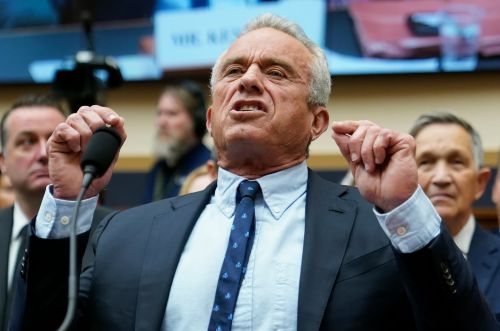

The laboratories dismantled, the scientists dismissed, the misinformation elevated; these choices are not reversible at will. Trust, once broken, takes decades to rebuild.

By Matthew A. McIntosh
Public Historian
Brewminate
The Rise of a Troubling Figure
Robert F. Kennedy Jr. has long been a polarizing figure. Once regarded as an environmental advocate with a recognizable family name, he has since become a prominent face of vaccine skepticism and conspiratorial rhetoric. His second act is no longer confined to outsider campaigns. With political power in his grasp, Kennedy has begun reshaping federal health institutions in ways that alarm doctors, scientists, and policy experts alike.
What makes his influence so dangerous is not simply his lack of medical training. Presidents and administrators have always relied on advisors to compensate for their own gaps. The difference here is that Kennedy does not trust the advisors worth listening to. Instead, he dismisses them outright, preferring voices that echo his suspicions rather than challenge them.
From Parasites to Policy
Kennedy’s personal history has added strange and unsettling layers to the story. He has publicly described a parasitic worm that once lodged in his brain, leaving him with memory problems and cognitive fog. This detail might have faded into a footnote if it stood alone, but paired with his history of heroin addiction it feeds a narrative of fragility. His defenders call it resilience. His critics call it evidence of poor judgment, a body and mind that cannot be trusted with national health.
One cannot help noticing the irony. A man who speaks loudly about medical danger and distrust of science has himself been shaped by very real biological vulnerabilities. The worm and the drugs are anecdotes, but they resonate because they mirror his politics: an inability to separate fact from fear, medicine from mythology. When those personal shadows extend into public policy, the consequences become collective.
The Purge of Expertise
Kennedy’s purge of scientific voices is not a whispering rumor but a visible pattern. Senior health officials with decades of experience have been pushed aside, their positions filled by figures whose chief qualification is loyalty to his worldview. The effect is not quiet bureaucratic reshuffling. It is an open declaration that expertise itself is no longer the currency of public service.
Some of the replacements are startling in their lack of preparation. These appointments are not accidents. They reveal a deliberate strategy to dismantle trust in established science and elevate conspiratorial thinking into the heart of federal decision-making.
The consequences ripple quickly. Agencies once considered authoritative are issuing contradictory guidance. Vaccine uptake is faltering, with misinformation moving faster than fact. Hospitals in some regions report an uptick in diseases thought to be controlled, a worrying sign of what happens when institutional stability is hollowed out.
The Broader Context of Conspiracy
Conspiracy has always circulated on the fringes, but in the last decade it has migrated into the bloodstream of American politics. Social media has been its accelerant, connecting scattered voices and turning speculation into communities of belief. Kennedy did not invent this ecosystem. He simply mastered it, harnessing the energy of distrust and turning it into policy.
The difference is that he now commands institutional power. Conspiracies once confined to podcasts or fringe conferences are written into official policy memos. This dynamic recalls earlier episodes in American history when anti-intellectual movements gained traction, battles over evolution in schools, or the silencing of AIDS researchers in the 1980s. In each case, lives were lost not only because of disease but because ideology trumped evidence.
A Nation at Risk
Public health is not built on slogans. It requires coordination, trust, and a baseline of shared facts. When Kennedy removes scientists and replaces them with unqualified allies, he weakens the entire architecture of disease prevention. The cracks spread quickly, visible in eroding vaccination campaigns and conflicting official statements that confuse rather than guide.
The risks stretch beyond ordinary flu seasons or localized outbreaks. Should a new pandemic emerge, the United States could find itself unable to respond effectively. Even routine food safety inspections or pharmaceutical approvals become suspect under a leadership that distrusts the very tools of science.
It is no exaggeration to say that Kennedy’s approach could cost lives. Public health works quietly, invisibly, until it is gone. Only when the machinery fails do people recognize what they have lost.
The Human Dimension
For ordinary Americans, the consequences are intimate. Parents who once trusted pediatricians now waver in confusion. Community clinics report patients declining vaccines they previously accepted without question. Scientists who spent years building careers in public service resign rather than serve under leadership that derides them.
In the homes of working families, this instability feels like a constant undertow. Trust that was once assumed is now fractured. Decisions about a child’s shot, an aging parent’s treatment, or the safety of everyday food are suddenly entangled with politics. This intrusion of conspiracy into daily life does not just harm institutions. It erodes the quiet assurances that allow people to live without fear.
Conclusion: The Cost of Unmoored Leadership
The unraveling of expertise under Kennedy is not an abstract policy debate. It is an experiment conducted on the entire nation without consent. The laboratories dismantled, the scientists dismissed, the misinformation elevated; these choices are not reversible at will. Trust, once broken, takes decades to rebuild. What remains is a dangerous paradox. Kennedy speaks the language of health but hollows out its meaning. He warns of threats to safety while becoming the threat himself. The peril lies not only in his rejection of science but in the vacuum it creates, where conjecture takes the place of evidence and ideology pretends to be fact. The price will not be measured in political headlines. It will be measured in lives.
Originally published by Brewminate, 09.10.2025, under the terms of a Creative Commons Attribution-NonCommercial-NoDerivatives 4.0 International license.


